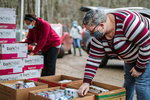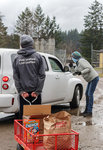


Food Backpacks 4 Kids, now just over a decade old, transformed during the pandemic. In a matter of months, the organization more than doubled the amount of food going to families, moving from sending students home with backpacks containing 10 pounds of nonperishable food each week to running a drive-through operation where families pick up boxes filled with non-perishables along with produce, meat and dairy.
“We are feeding families,” said FB4K Executive Director Richard Miller.
In early 2020, FB4K was run by three part-time staff and a team of valued volunteers. From its first day in 2009 when it sent nine Evergreen students home for the weekend with food-filled backpacks, the program expanded to serve all schools in the district. Each school had a champion in 2020 — the principal or a teacher or a counselor — to be sure the program worked for students. Two hundred and ninety-three students participated, with backpacks for grade schoolers and food pantries serving the middle and high schools.
Miller, who also teaches photography and art at Key Peninsula Middle School, said that when the pandemic led to school closure the organization had to pivot rapidly to be sure vulnerable students and their families would not go hungry.
Rather than send kids home with food, FB4K designed a drive-through pick-up model. COVID-19 risks meant that the retirees who had been the backbone of the volunteer staff could no longer safely work. Miller and the staff networked to recruit an under-60 group of volunteers who now number about 20. Of those, 10 are his “stalwarts.”
“It’s heavy and intense work,” he said, “with hours of filling, lifting and carrying boxes of food.”
Every Wednesday volunteers receive deliveries, sort, store and then prepack boxes with nonperishables according to family size. On a typical Friday afternoon, families registered with the program arrive in a steady stream of cars at FB4K’s lot in Key Center, greeted by operations manager Zaida Woodworth and her volunteers.
Perishables — meat, milk, cheese, produce — are added as the families arrive. Shelves and tables outside the warehouse have random extras that families can also take home. One Friday there were enormous boxes of chocolate bark. There is a second distribution site in Gig Harbor, near the old Peninsula Gardens.
“This is the best job I have ever had,” Woodworth said. She is one of the three part-time employees who coordinate the program, including Miller and office manager Michelle Johnson.
“I am so grateful for our staff,” FB4K Board President Joe Urvina said. “They saw the need and filled it. They created partnerships to make sure families who couldn’t get to Key Center got food. They have knocked it out of the park.”
One family of nine (parents, a grandparent and six children) has participated in the program for several years. “My husband’s hours were cut during the pandemic,” said the mother of the household, “so the extra food has really helped.” She added that her older children were embarrassed to take food home from school and being able to come to the distribution site has made thing easier.
Another mother, new to the program, arrived with her four young children. She originally found out about FB4K at church and started to volunteer. When she discovered that the program is for all families with children 18 and under (her kids aren’t yet in school) and not limited to students in Peninsula School District schools, she signed up. Her husband lost his job. While they had a cushion of savings and he now has a new job, it meant a pay cut. The FB4K program means they can make ends meet.
“We are now serving 567 kids,” Miller said. “Pre pandemic we distributed about 3,000 to 4,000 pounds of food a week. Now it is 7,000 to 9,000 pounds. We’ve been running at emergency speed for nine months.” It its first 10 years the program distributed a million pounds of food. Between March and December, it sent 250,000 pounds home with families.
New coolers and freezers line the warehouse — purchased through a grant to store the perishables they now send home with families — along with shelves of canned goods, peanut butter, masa, rice and beans. Emergency Food Network, essentially a foodbank for foodbanks, provides most of the food, but what they can provide is limited to what is donated to them. FB4K works with organizations on targeted food drives, requesting specific items when there are gaps. They also purchase from WinCo and Costco as needed. Funding comes from grants and donations from businesses and individuals.
Miller anticipates that when the pandemic is over and schools reopen, FB4K will pivot once again. “I think we will have a hybrid program,” he said. “We’ll have the backpacks and the food pantries, but probably will have drive-thru pickups twice a month.”
Other items that may interest you
UNDERWRITTEN BY THE FUND FOR NONPROFIT NEWS (NEWSMATCH) AT THE MIAMI FOUNDATION, THE ANGEL GUILD, ADVERTISERS, DONORS AND PEOPLE WHO SUPPORT INDEPENDENT, NONPROFIT LOCAL NEWS
